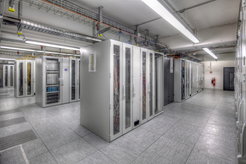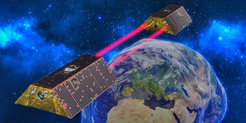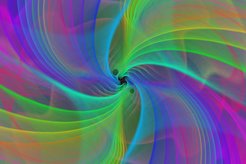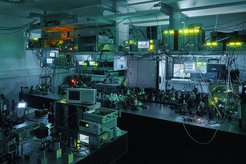Leibniz AnsprechBAR
“Nachgefragt!” (Asked again) in the Year of Science 2022 – Open Day at AEI Hannover on 5 November 2022.
On Saturday, 5 November 2022, from 12:00 to 18:00, Leibniz University Hannover will open its doors to everyone interested. Under the title “Leibniz AnsprechBAR: Ihre Fragen an die Wissenschaft - Die LUH im Wissenschaftsjahr 2022” (Leibniz AnsprechBAR: Your Questions for Science – The LUH in the Year of Science 2022), it will present itself as an open place of science where researchers can be approached for dialog with citizens. The Max Planck Institute for Gravitational Physics and the Institute for Gravitational Physics at Leibniz University Hannover participate in this Open Day. There will be public popular-science lectures, laboratory tours and visits to the Atlas computer cluster. The lectures will be offered as a hybrid event with remote participation on a video conferencing platform.
Lecture programme
All lectures will be offered as hybrid events. You can join our lectures via Zoom.
Obtain further information on the indiviual events below or by clicking on them.
| time | lecture (room 103, building 3401) |
|---|---|
| 12:15 - 13:00 | How does laser light in space weigh Greenland's ice? (in German) |
| 13:15 - 14:00 | What do gravitational waves tell us about the Universe? (in German) |
| 14:15 - 15:00 | What does the future hold for gravitational-wave astronomy? (in German) |
| 15:15 - 16:00 | Can you see black holes? (in German) |
| 16:15 - 17:00 | How does a gravitational-wave observatory in space work and what new things can we learn from it? (in German) |
Guided tours
Obtain further information on the indiviual events below or by clicking on them.
Information on the individual events
How powerful is the fastest computer cluster for gravitational-wave searches?

Type of event: guided tour (in German)
Dates: 12:15 to 13:00, 13:15 to 14:00, 14:15 to 15:00, 15:15 to 16:00, 16:15 to 17:00, 17:15 to 18:00
Location: building 3401, institute foyer (Callinstraße 38, 30167 Hannover)
Accessibility: barrier-free
The high-throughput computing cluster Atlas is the world's largest and most powerful facility for the search for gravitational waves and the data analysis required for this endeavour. Atlas provides a unique environment for scientists to study data from, for example, gravitational-wave detectors and to detect new signals. Atlas has more than 23 petabytes of total storage space and approximately 99,000 CPU and 1.7 million GPU cores in 3,200 compute servers. Take a behind-the-scenes look at Atlas in this guided tour!
How does laser light in space weigh Greenland's ice?

Type of event: lecture (in German)
Date: 12:15 to 13:00
Location: building 3401, Room 103 (Callinstraße 38, 30167 Hannover)
Accessibility: barrier-free
Even babies explore the force of gravity when they drop or throw objects. If you accelerate things strongly enough, they fall around the Earth like satellites. Their orbit is affected by the Earth's mass distribution beneath them. Earth gravity field surveys from space take advantage of this. Since May 2018, the two GRACE Follow-On satellites have been orbiting the Earth following one another. Measurements with microwaves and laser light record tiny changes in the distance between them. From these data, monthly maps of the Earth's changing gravitational field can be created, allowing to detect changes in the water table in India or mass movements caused by earthquakes. They also provide important insights for climate research, showing ice mass loss in polar regions or sea level rise. This lecture explains how the measurement principle and technology work and what the Earth gravity field maps reveal.
Join the event remotely (via Zoom)
What do gravitational waves tell us about the Universe?

Type of event: lecture (in German)
Date: 13:15 to 14:00
Location: building 3401, Room 103 (Callinstraße 38, 30167 Hannover)
Accessibility: barrier-free
Since the first direct detection of gravitational waves in 2015, the Universe can not only be observed with electromagnetic telescopes and neutrino detectors, but also eavesdropped on, so to speak, with gravitational-wave detectors. They are now so sensitive that they are limited by quantum effects of their laser light. What astrophysical discoveries have been made in recent years? What limits the current and next generations of detectors, and what does the future hold?
Join the event remotely (via Zoom)
How do you develop new technology and ultra-precise laser systems for gravitational-wave detectors?

Type of event: guided tour (in German)
Dates: 13:15 to 14:00, 14:15 to 15:00
Location: building 3401, institute foyer (Callinstraße 38, 30167 Hannover)
Accessibility: not barrier-free
Visit our laboratories and learn more about the daily lab work at the Albert Einstein Institute Hannover in this English language tour! The AEI has a long history in the design, fabrication and installation of lasers that measure the stretching and squeezing of space in gravitational-wave detectors with ultra-high precision. The laser systems of current detectors are from Hannover. And our scientists are also developing even more powerful devices for the next generation of gravitational-wave detectors. The institute's “10-meter prototype” is a large experiment for the development and tests of new technology for current and future gravitational-wave detectors and it serves to train the next generation of researchers.
What does the future hold for gravitational-wave astronomy?

Type of event: lecture (in German)
Date: 14:15 to 15:00
Location: building 3401, Room 103 (Callinstraße 38, 30167 Hannover)
Accessibility: barrier-free
The network of terrestrial gravitational-wave detectors has observed 90 mergers of black holes and neutron stars. Soon, the next observing run will begin and many more events will follow. But what other signals and discoveries are expected and what could they tell us about the Universe? Answers to these questions and a look at the “signal wish list” of gravitational physicists will among the topics covered in this talk.
Join the event remotely (via Zoom)
How do you develop new technology and ultra-precise laser systems for gravitational-wave detectors?

Type of event: guided tour (in English)
Dates: 15:15 to 16:00, 16:15 to 17:00
Location: building 3401, institute foyer (Callinstraße 38, 30167 Hannover)
Accessibility: not barrier-free
Visit our laboratories and learn more about the daily lab work at the Albert Einstein Institute Hannover in this English language tour! The AEI has a long history in the design, fabrication and installation of lasers that measure the stretching and squeezing of space in gravitational-wave detectors with ultra-high precision. The laser systems of current detectors are from Hannover. And our scientists are also developing even more powerful devices for the next generation of gravitational-wave detectors. The institute's “10-meter prototype” is a large experiment for the development and tests of new technology for current and future gravitational-wave detectors and it serves to train the next generation of researchers.
Can you see black holes?

Type of event: hands-on activity, lecture (in German)
Date: 15:15 to 16:00
Location: building 3401, Room 103 (Callinstraße 38, 30167 Hannover)
Accessibility: barrier-free
Black holes are among the strangest objects in the known Universe. But what are black holes anyway? How do we know they exist? In a short lecture and interactive computer experiments, you can experience black holes yourself.
How does a gravitational-wave observatory in space work and what new things can we learn from it?

Type of event: lecture (in German)
Date: 16:15 to 17:00
Location: building 3401, Room 103 (Callinstraße 38, 30167 Hannover)
Accessibility: barrier-free
LISA (short for "Laser Interferometer Space Antenna") will be the largest observatory ever built by mankind. The laser triangle in space will measure two and a half million kilometers, spanned by three satellites. With the help of LISA, gravitational waves from the entire Universe will be received starting in the mid-2030s. But how does it work and what new things can it teach us about the cosmos?
Join the event remotely (via Zoom)







